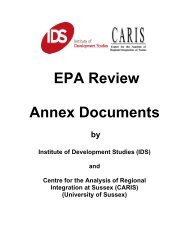The Impact of Energy Use on Poor Urban Livelihoods in ... - DfID
The Impact of Energy Use on Poor Urban Livelihoods in ... - DfID
The Impact of Energy Use on Poor Urban Livelihoods in ... - DfID
Create successful ePaper yourself
Turn your PDF publications into a flip-book with our unique Google optimized e-Paper software.
2.2 February Workshops<br />
A Study <str<strong>on</strong>g>of</str<strong>on</strong>g> the <str<strong>on</strong>g>Impact</str<strong>on</strong>g> <str<strong>on</strong>g>of</str<strong>on</strong>g> <str<strong>on</strong>g>Energy</str<strong>on</strong>g> <strong>on</strong> <strong>Poor</strong> <strong>Urban</strong> <strong>Livelihoods</strong> <strong>in</strong> Arusha, Tanzania<br />
<str<strong>on</strong>g>The</str<strong>on</strong>g> Study: <str<strong>on</strong>g>The</str<strong>on</strong>g> impact <str<strong>on</strong>g>of</str<strong>on</strong>g> energy use <strong>on</strong> poor urban women and girls’ livelihoods <strong>in</strong> Arusha, Tanzania<br />
Study funded by UK Department for Internati<strong>on</strong>al Development (DFID)<br />
This study aims to improve the understand<strong>in</strong>g <str<strong>on</strong>g>of</str<strong>on</strong>g> the l<strong>in</strong>kages between the provisi<strong>on</strong> <str<strong>on</strong>g>of</str<strong>on</strong>g> energy use and<br />
the achievement <str<strong>on</strong>g>of</str<strong>on</strong>g> Millennium Development Goals (MDG), specifically <strong>in</strong> relati<strong>on</strong> to:<br />
MDG 2 -Achiev<strong>in</strong>g universal primary and sec<strong>on</strong>dary educati<strong>on</strong>;<br />
MDG 3- Achiev<strong>in</strong>g gender equality and women’s empowerment.<br />
Thus it is c<strong>on</strong>cerned with:<br />
� collect<strong>in</strong>g micro level evidence about the use <str<strong>on</strong>g>of</str<strong>on</strong>g> energy <strong>in</strong> poor urban households <strong>in</strong>clud<strong>in</strong>g the<br />
energy decisi<strong>on</strong> mak<strong>in</strong>g process <strong>in</strong> female and male headed households;<br />
� understand<strong>in</strong>g how poor women and girls can optimise their use <str<strong>on</strong>g>of</str<strong>on</strong>g> energy through the use <str<strong>on</strong>g>of</str<strong>on</strong>g> cleaner<br />
and more efficient energy;<br />
� test<strong>in</strong>g assumpti<strong>on</strong>s c<strong>on</strong>cern<strong>in</strong>g the relati<strong>on</strong>ship between energy and the achievement <str<strong>on</strong>g>of</str<strong>on</strong>g> MDGs 2<br />
and 3.<br />
� <strong>in</strong>form<strong>in</strong>g urban energy/poverty policies;<br />
<strong>Urban</strong> poverty is relatively poorly researched and there is currently a paucity <str<strong>on</strong>g>of</str<strong>on</strong>g> micro level studies <strong>on</strong><br />
energy use its impact <strong>on</strong> the livelihoods <str<strong>on</strong>g>of</str<strong>on</strong>g> the urban poor. This despite the fact that there is evidence<br />
that urban families may spend 29% <str<strong>on</strong>g>of</str<strong>on</strong>g> their <strong>in</strong>come <strong>on</strong> fuels.<br />
Prelim<strong>in</strong>ary F<strong>in</strong>d<strong>in</strong>gs<br />
<str<strong>on</strong>g>The</str<strong>on</strong>g>se are grouped under three head<strong>in</strong>gs; those relat<strong>in</strong>g to the types <str<strong>on</strong>g>of</str<strong>on</strong>g> fuel used and the way it is used; the energy decisi<strong>on</strong><br />
mak<strong>in</strong>g process <strong>in</strong> female and male headed households; and the issue <str<strong>on</strong>g>of</str<strong>on</strong>g> educati<strong>on</strong> for women and girls <strong>in</strong> poor households. It<br />
is clear that access to energy is a serious problem for the poor <strong>in</strong> urban areas. Despite its expense and decl<strong>in</strong><strong>in</strong>g quality the<br />
majority <str<strong>on</strong>g>of</str<strong>on</strong>g> households use charcoal and wood for cook<strong>in</strong>g. Currently electricity is expensive and unreliable and even the richest<br />
households do not use it for cook<strong>in</strong>g. Only two households have been identified as us<strong>in</strong>g gas for cook<strong>in</strong>g. In large part this is<br />
due to c<strong>on</strong>cern over its safety. Very few households use energy sav<strong>in</strong>g stoves.<br />
In both male and female headed households the decisi<strong>on</strong>s are most likely to be made by men. This means that men’s<br />
preferences, for example for a new radio take precedence over women’s choices, for example for a new energy sav<strong>in</strong>g stove.<br />
Any time saved by women and girls by us<strong>in</strong>g energy more efficiently is unlikely to be used <strong>on</strong> educati<strong>on</strong>. Boys are given<br />
preference over girls. Moreover poor households see educati<strong>on</strong> as a luxury that they cannot afford. Instead they need all<br />
household members to earn m<strong>on</strong>ey for daily liv<strong>in</strong>g expenses. <str<strong>on</strong>g>The</str<strong>on</strong>g>refore any time saved by women and girls is likely to be used<br />
for this.<br />
<str<strong>on</strong>g>The</str<strong>on</strong>g> Workshop<br />
<str<strong>on</strong>g>The</str<strong>on</strong>g> objectives are<br />
• <str<strong>on</strong>g>The</str<strong>on</strong>g> dissem<strong>in</strong>ati<strong>on</strong> and discussi<strong>on</strong> <str<strong>on</strong>g>of</str<strong>on</strong>g> prelim<strong>in</strong>ary f<strong>in</strong>d<strong>in</strong>gs from the study;<br />
• To identify community energy soluti<strong>on</strong>s<br />
Participants<br />
• Representatives <str<strong>on</strong>g>of</str<strong>on</strong>g> M<strong>in</strong>istries <str<strong>on</strong>g>of</str<strong>on</strong>g> <str<strong>on</strong>g>Energy</str<strong>on</strong>g> and M<strong>in</strong>erals and Community Development, Gender<br />
and Children<br />
• Representative <str<strong>on</strong>g>of</str<strong>on</strong>g> Regi<strong>on</strong>al Commissi<strong>on</strong>er’s Office<br />
• Nati<strong>on</strong>al and Regi<strong>on</strong>al representatives <str<strong>on</strong>g>of</str<strong>on</strong>g> TANESCO<br />
• Representatives <str<strong>on</strong>g>of</str<strong>on</strong>g> Arusha Municipal Council<br />
• Ward Extensi<strong>on</strong> workers<br />
• Representatives <str<strong>on</strong>g>of</str<strong>on</strong>g> nati<strong>on</strong>al and district NGOs<br />
• Representatives from local government primary and sec<strong>on</strong>dary schools<br />
• Men, women and youths from poor and n<strong>on</strong>-poor households <strong>in</strong> Kaloleni and Daraja Mbili<br />
who took part <strong>in</strong> the study<br />
Development Plann<strong>in</strong>g Unit, UCL L<strong>on</strong>d<strong>on</strong><br />
Dr. Sheilah Meikle and Patrice North
















